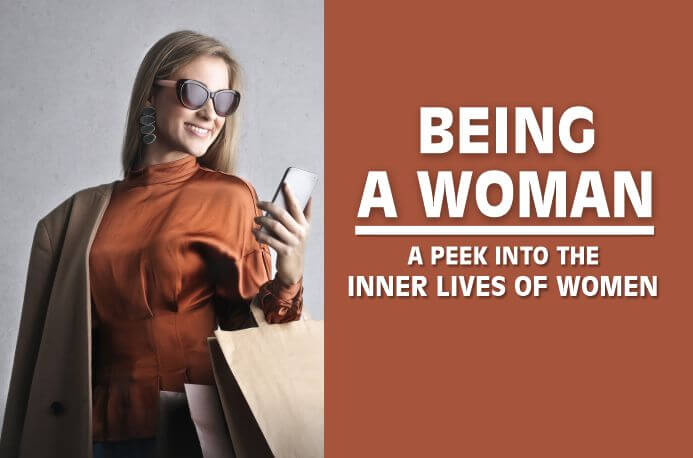Last updated on January 10th, 2024 at 08:01 pm
Understand what being a woman means, and their experiences in society – from challenges to triumphs, and take a peek into their inner lives.
In my childhood, I was always fantasizing about what it felt like to be the opposite sex.
I often asked myself, “Are they happy being women”?
Later in adulthood, I didn’t know if I was to blame Providence, for not making me a woman.
Women are a well of mystery and continuous discovery, and that is why they can’t be appreciated enough.
Women have always played a significant role in society, yet their unique experiences and inner lives often remain misunderstood or underappreciated.
A trip into their inner world reveals a complex web of strength, struggles, and dreams that are often hidden in plain view.
I have a few women around me and I am amazed at how fascinating and at the same time, turbulent their lives are, owing to the societal expectations and pressures on the feminine identity.
Being a man is not easy, but being a woman is harder.
What fascinates me more about the feminine gender is their effortless internal beauty that embodies all softness and goodwill.
In this article, we have prepared an exhaustive experience for you, into the layers of womanhood, examining the challenges faced, the strengths exhibited, and the aspirations held close to the hearts of women.
Table of Contents
- Who is a Woman?
- What Being a Woman Means to Women
- How Does Womanhood Fit into Society?
- The Social and Cultural Influences on Women
- The Influence of Body Image and Self-esteem on Women
- Education and Careers
- Relationship and Family
- Impact of Health and Reproductive Rights on Women
- Intersectionality
- Empowerment and Activism
- Nurturing Strength and Resilience as a Woman
- Exploring Emotional Depth as a Woman
- Balancing Personal and Professional Life as a Woman
- The Power of Sisterhood
- The Dreams and Aspirations in Being a Woman
- Frequently Asked Questions
- Final Thought
Who is a Woman?

While the definition of woman can be controversial, given the controversy surrounding ‘gender’, we will go ahead with the traditional definition of woman.
A woman is an adult female human. She typically possesses two X chromosomes, is biologically capable of pregnancy, childbirth, and breastfeeding.
Women play various roles in society, including mothers, daughters, sisters, and professionals.
They contribute significantly to family, community, and global development through their unique talents, perspectives, and contributions.
Women have been integral to shaping history and continue to strive for gender equality and empowerment.
Related: Embracing Your Feminine Side To Feel Confident And Beautiful
What Being a Woman Means to Women
Being a woman means different things to different women, as their experiences and perspectives vary.
However, there are some common themes and shared understanding of what being a woman encompasses.
Let’s hear what the women have to say:
Anna Logan has this to say:
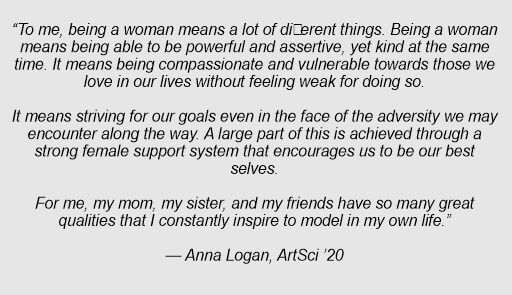
Brittany Gilliforte has this opinion to give as a woman:
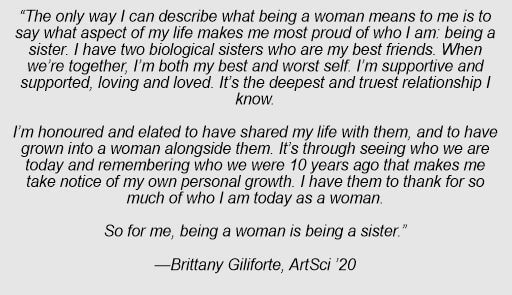
Julia Harmsworth’s opinion:
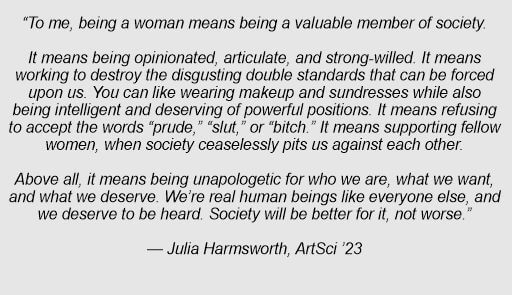
Iona Cleave has this to say:
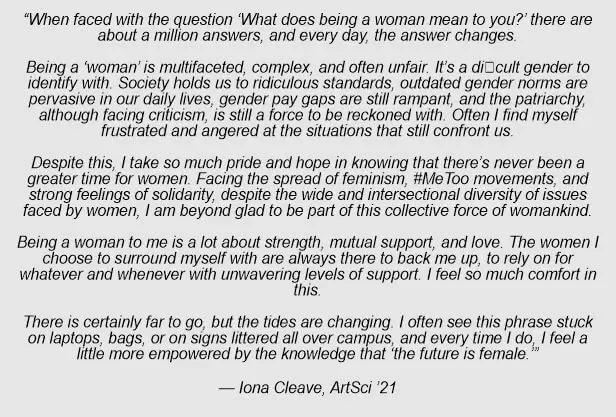
Genevieve Nolet gives her opinion about womanhood:
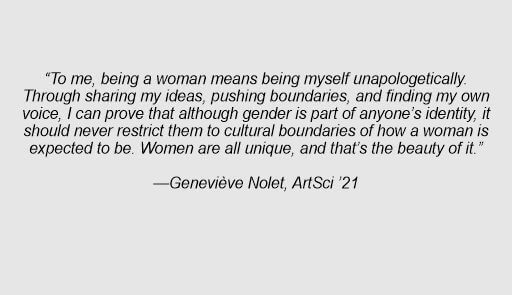
Tegwyn Hughes:
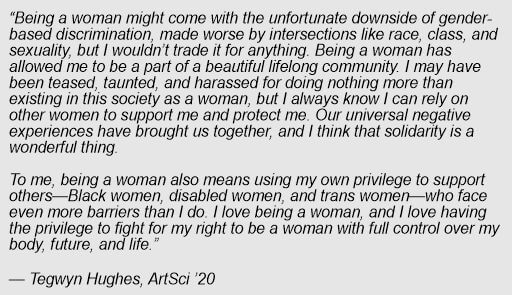
How Does Womanhood Fit into Society?
Women play diverse and essential roles in society, contributing to its fabric in many ways.
They excel in professional domains, nurture families, lead communities, and advocate for social change.
Women’s perspectives enrich decision-making, encouraging inclusivity and equity.
Their influence spans education, healthcare, business, governance, and beyond, shaping a more holistic and empathetic society.
Embracing the complexities of women’s experiences and empowering their voices leads to a more vibrant society.
Also Read: Why the Intuition of Women Is More Powerful Than That Of Men
The Social and Cultural Influences on Women

To truly understand the inner lives of women, we must first acknowledge the influence of the social and cultural factors in shaping their identities.
Cultural and societal influences significantly shape the experiences of being a woman, impacting their roles, opportunities, and treatment within their communities.
These influences are multifaceted and can be observed through gender stereotypes, media portrayal, and cultural expectations and norms.
Let’s take a look at how this plays out:
1. Gender Stereotypes
Gender stereotypes play a pivotal role in shaping women’s lived experiences.
These stereotypes often dictate societal expectations regarding women’s behaviour, abilities, and roles.
For example, the stereotype that women are primarily caregivers and homemakers can limit their opportunities for career advancement and leadership roles.
Additionally, stereotypes about women’s emotional sensitivity or lack of technical aptitude hampers their progress.
It can influence how they are perceived and treated in various social and professional settings.
These stereotypes can lead to discrimination, unequal treatment, and limited access to resources and opportunities for women.
Related: Related: Tips on How a Gentleman Should Treat a Lady
2. The Media
The media in like manners wields significant influence in shaping perceptions of women.
Portrayals of women in media, including television, film, advertising, and social media, often reinforce and perpetuate gender stereotypes.
Women are frequently depicted in narrow and often unrealistic roles, emphasizing physical appearance, domesticity, and romantic relationships.
Such portrayals can contribute to the objectification of women, perpetuate unrealistic beauty standards, and limit the representation of women in diverse and empowering roles.
Media representations can also impact women’s self-esteem, body image, and aspirations, influencing how they perceive themselves and are perceived by others.
Related: 11 Reasons Women Love Drama
3. Cultural Expectations
Cultural expectations and norms also exert a measure of influence on women’s experiences.
These expectations are deeply rooted in traditions, beliefs, and societal structures, shaping women’s behaviour, opportunities, and status within their communities.
Cultural norms may dictate gender-specific roles and responsibilities, restrict women’s autonomy and decision-making power, and perpetuate unequal treatment in areas such as education, employment, and family life.
These expectations can create barriers for women seeking to challenge traditional gender roles, pursue non-traditional careers, or assert their independence.
Also Read: The Type of Women Guys Can’t Afford to Lose
The Influence of Body Image and Self-esteem on Women

Body image and self-esteem are important in being a woman.
They play significant roles in their well-being, influenced by societal standards of beauty, media representations, and personal perceptions of one’s physical appearance.
Let’s take a closer look…
1. Unrealistic Beauty Standards
Unrealistic beauty standards have an impact on women’s mental health.
Societal ideals often promote parochial standards of beauty, emphasizing specific body shapes, skin tones, and facial features.
These standards can lead to feelings of inadequacy, low self-worth, and body dissatisfaction among women who do not conform to these ideals.
The pressure to meet these unrealistic standards can contribute to anxiety, depression, and eating disorders, creating significant mental health challenges for many women.
Many women have deformed their bodies or even lost their lives trying to please society.
2. Social Media
Social media also plays a role in perpetuating body image issues among women.
Platforms such as Instagram, Facebook, and TikTok are often filled with curated images that promote idealized and often unattainable representations of beauty.
Filters, photo editing, and carefully crafted posts contribute to a distorted perception of reality, leading to comparisons and feelings of inadequacy among women.
Additionally, the prevalence of influencers and celebrities showcasing their seemingly flawless appearances can further exacerbate body image concerns and self-esteem issues among women.
Related: The Common Ground for Femininity and Feminism
3. Promoting Positive Body Image and Self-acceptance
Promoting positive body image and self-acceptance requires a multifaceted approach.
Education and awareness campaigns can help debunk unrealistic beauty standards and emphasize the diversity of beauty across different cultures and individuals.
Encouraging media literacy and critical thinking skills can empower women to question and challenge idealized representations of beauty in the media.
Furthermore, encouraging a culture of inclusivity and representation in media and advertising can help promote diverse body types and appearances, fostering a more inclusive and empowering environment for women.
Individual and collective efforts to promote self-acceptance and positive body image can also be beneficial.
Related: Etiquette Rules for Women
Education and Careers
Education and careers play a pivotal role in shaping the opportunities and experiences of women, yet they are often influenced by various barriers and gender disparities.
Here is how all of that pans out…
1. Barriers to Education
Barriers to education faced by women can include factors such as
- Limited access to schooling
- Cultural Norms that Prioritize Boys’ Education
- Early marriage and pregnancy
- Lack of resources, and safety concerns
In some regions, societal expectations may prioritize domestic responsibilities over educational pursuits for girls, leading to disparities in educational attainment.
Additionally, economic constraints and discriminatory practices can further impede women’s access to quality education, limiting their opportunities for personal and professional growth.
2. Gender Disparities
Gender disparities in career advancement and leadership positions persist in many industries and workplaces.
Women often encounter barriers such as unequal pay and limited access to leadership roles.
They also encounter workplace discrimination, and challenges in balancing career advancement with family responsibilities.
These disparities are rooted in systemic biases, stereotypes, and cultural norms.
These norms perpetuate unequal treatment and opportunities for women in the workforce.
As a result, they are underrepresented in leadership positions and face obstacles in career progression compared to their male counterparts.
Related: Challenges Women Face and How they Overcome
3. Promoting Gender Equality
Promoting gender equality in education and the workplace requires concerted efforts at various levels.
Initiatives addressing barriers to girls’ education, including safe learning environments and financial support, are crucial for equal access.
Curriculum reforms challenging gender roles promote inclusivity, fostering a more equitable educational experience for all.
Promoting gender equality in the workplace requires policies addressing pay equity, career advancement, and inclusive environments.
This involves mentorship, flexible work arrangements, and combating discrimination.
Related: What is Gynophobia?
Relationship and Family

It’s important to recognize that women often face unique challenges and expectations within relationships and family dynamics.
These can impact their well-being and opportunities for personal and professional growth.
Let’s examine how this factors into being a woman…
1. Barriers to Education
Relationships and family can be a barrier to women’s education which also influence their roles within society.
In some cultures and societies, women may encounter resistance to pursuing education due to traditional gender roles.
These roles prioritize domestic responsibilities over academic pursuits.
Also, early marriage, caregiving duties, and limited financial resources can further impede women’s access to education, perpetuating disparities in educational attainment.
2. Gender Roles and Expectations within Relationships
Gender roles and expectations within relationships can significantly impact a woman’s experiences of being a woman.
Traditional gender roles may dictate that women assume primary caregiving and household responsibilities.
These responsibilities can create challenges for women seeking to balance these duties with their career aspirations.
These expectations limit women’s opportunities for personal and professional fulfillment, perpetuating unequal distribution of labor within relationships and families.
3. Balancing Career and Family Responsibilities
Balancing career and family responsibilities is a common challenge for many women.
The expectation to fulfill caregiving duties while pursuing a career can create significant stress and strain on women.
Achieving a balance between work and family responsibilities often requires support from partners, access to affordable childcare, flexible work arrangements, and societal recognition of the value of caregiving responsibilities.
4. Domestic Violence and Inequality
Addressing issues of domestic violence and inequality within families is the right step for promoting the well-being of women.
Domestic violence and unequal power dynamics within relationships can have devastating effects on women’s physical and emotional health.
It is essential to provide support services, legal protections, and resources for women experiencing domestic violence.
Additionally, challenging traditional gender norms and promoting healthy, equitable relationships within families is essential for addressing issues of inequality and promoting women’s interests.
Impact of Health and Reproductive Rights on Women
Health and reproductive rights are critical aspects of being a woman.
This covers access to healthcare, reproductive autonomy, and comprehensive medical support.
Let’s go beyond the surface…
1. Access to Healthcare
Access to healthcare and the gender healthcare gap remain a significant issue in being a woman.
Disparities in access to healthcare services, including preventive care, maternal health services, and treatment for reproductive health issues, can negatively affect women.
The gender healthcare gap can result from various factors, including economic barriers, lack of healthcare infrastructure, cultural norms, and gender biases within the healthcare system.
These disparities can lead to delayed diagnoses, inadequate treatment, and unequal access to essential healthcare services for women.
2. Challenges Related to Reproductive Rights
Challenges related to reproductive rights and family planning can impact women’s autonomy and interests.
Women may face obstacles in accessing contraception, reproductive health information, and safe, legal abortion services.
Societal and cultural stigmas surrounding reproductive health choices can further limit their ability to make informed decisions about their reproductive futures.
Additionally, inadequate support for family planning and maternal health services also leads to challenges in managing reproductive health and planning for healthy pregnancies.
3. Importance of Healthcare for Women
The importance of comprehensive healthcare for women cannot be overstated.
Comprehensive healthcare covers access to a wide range of services, including preventive care, reproductive health services, mental health support, and treatment for chronic conditions.
It also includes addressing the unique health needs of women across the lifespan, including maternal health, menopause, and gynecological care.
By providing comprehensive healthcare, women can receive the support and resources necessary to maintain their wellness.
It also helps them make informed reproductive choices, and address their specific health needs.
Intersectionality
Intersectionality is a concept that acknowledges the interconnected nature of social categorizations such as race, ethnicity, gender, sexuality, and socioeconomic status, and how these intersect to shape people’s experiences and opportunities.
In being a woman, it’s crucial to recognize the impact of intersectionality and address the unique challenges faced by marginalized women.
Recognizing the diverse experiences of women based on race, ethnicity, and sexuality is crucial for understanding gender inequality.
Addressing unique barriers faced by marginalized women involves dismantling systemic inequalities that disproportionately affect certain groups.
Advocating for inclusive feminism and intersectional perspectives is essential for promoting gender equality.
Also, it helps in amplifying marginalized voices and encouraging solidarity among women from diverse backgrounds.
This approach allows for a more comprehensive understanding of gender inequality and promotes diversity within feminist movements.
Empowerment and Activism
Empowerment and activism are important components of being a woman.
They advance the rights and opportunities of women, and they include inspiring leadership, feminist movements, and support for women’s voices.
Inspiring women leaders and activists like Malala Yousafzai and Greta Thunberg, as well as political figures such as Angela Merkel and Jacinda Ardern, have demonstrated remarkable leadership.
Feminist movements, including the suffragist and #MeToo movements, have challenged norms and promoted equality.
Supporting and amplifying women’s voices through mentorship, diverse representation, and activism contributes to positive societal change.
Nurturing Strength and Resilience as a Woman
Despite facing challenges, being a woman is showing remarkable strength and resilience.
The ability to carry life and nurture it within them is a testament to their power.
Women continually champion their ambitions and strive for success in various realms, often juggling multiple responsibilities to make their dreams a reality.
The emotional intelligence exhibited by women is another remarkable trait.
They possess a unique capacity to cultivate deep connections and empathize with others, often being the emotional bedrock for their families and communities.
This emotional intelligence enables women to navigate difficult situations with grace and compassion.
Exploring Emotional Depth as a Woman
In being a woman, women possess strong emotional makeup, often experiencing a wide range of feelings more deeply than their male counterparts.
The ability to empathize and tap into the emotions of others is a strength that allows them to build nurturing relationships and create a sense of unity in their communities.
They also face unique emotional challenges throughout their lives.
From the rollercoaster of emotions experienced during menstrual cycles and pregnancies to the complex feelings associated with motherhood, these emotional trips contribute significantly to their overall well-being and sense of identity.
Balancing Personal and Professional Life as a Woman
One of the recurrent themes in the lives of women is the struggle to balance personal and professional commitments.
Often dubbed the “double shift,” women juggle their careers with household chores, childcare, and the emotional labour that comes with maintaining relationships.
This delicate balance requires skilled time management, negotiation, and resilience to navigate successfully.
Furthermore, societal expectations can create a sense of guilt when women prioritize their careers or personal growth over traditional familial roles.
The internal conflict that arises from this dichotomy requires women to reevaluate their priorities continually, seeking a harmonious integration of personal and professional aspirations.
The Power of Sisterhood
An integral part of being a woman is the sisterhood that exists amongst them.
This bond provides a safe space for vulnerability, support, and growth.
Women often rely on each other for emotional guidance, sharing experiences, and navigating life’s challenges together in being women.
The sisterhood promotes a sense of belonging and the validation of experiences that might otherwise be dismissed or unheard.
The Dreams and Aspirations in Being a Woman
Beyond the struggles and complexities, women have dreams and aspirations that drive them.
They aspire to break barriers, shatter glass ceilings, and be catalysts for change in society.
These dreams may manifest in various forms, such as pursuing their intellectual passions, making a significant impact in their chosen careers, or championing social justice causes that resonate with their core values.
Frequently Asked Questions
What being a woman means?
Being a woman means embracing diverse experiences, contributing to society, and navigating unique challenges and triumphs that shape individual identity and collective progress.
What is the idea of being a woman?
The idea of being a woman encompasses multifaceted roles, perspectives, and contributions that enrich communities and advance societal development.
What is the importance of being a woman?
The importance of being a woman lies in fostering inclusivity, diversity, and equity, amplifying voices, and promoting positive change in all spheres of life.
What it means to be a lady?
Being a lady entails embodying grace, strength, and resilience while challenging stereotypes and contributing to a more inclusive and equitable society.
Final Thought
The inner lives of women are a web of strength, resilience, struggles, and aspirations.
Understanding and acknowledging the challenges they face, the emotional depth they possess, and the power of sisterhood that nourishes them allows us to appreciate the essence of womanhood.
By uplifting women, celebrating their achievements, and working towards a more equitable society, we can create a future where being a woman and their inner lives of women are acknowledged, respected, and celebrated.
REFERENCES:
- 12 Things About Being A Woman That Women Won’t Tell You
- What It Means To Be A Woman
- https://www.teenvogue.com/gallery/international-womens-day-2019-what-womanhood-means
- https://www.betterhelp.com/advice/general/understanding-what-does-it-mean-to-be-a-woman/
- https://www.queensjournal.ca/what-being-a-woman-means-to-us-this-international-womens-day/
- https://www.womenadvancenc.org/2022/04/08/what-does-being-a-woman-mean-to-you/
Pious Clements is the insightful voice behind "The Conducts of Life" blog, where he writes about life ethics, self-development, life mastery, and the dynamics of people and society.
With a profound understanding of human behaviuor and societal dynamics, Pious offers thought-provoking perspectives on ethical living and personal growth.
Through engaging narratives and astute observations, he inspires readers to navigate life's complexities with wisdom and integrity, encouraging a deeper understanding of the human experience and our place within society.
